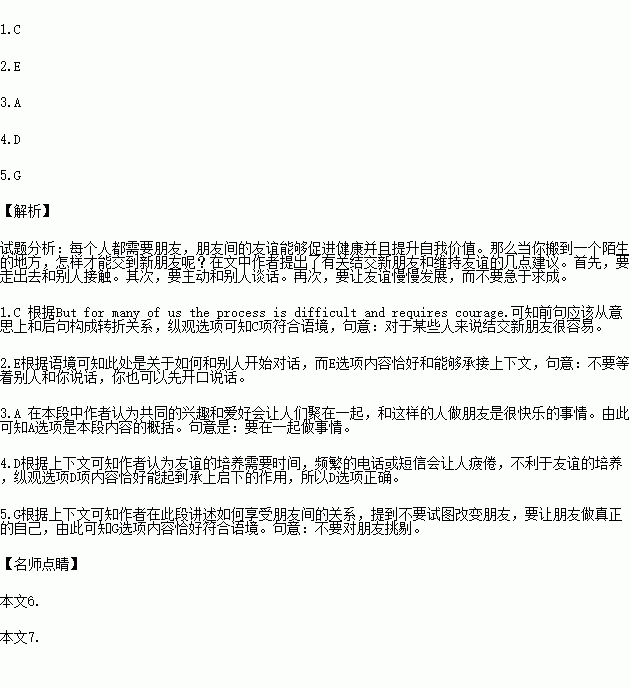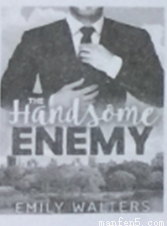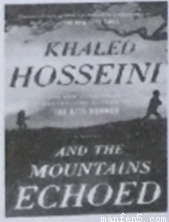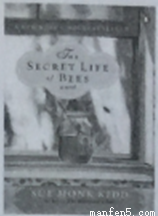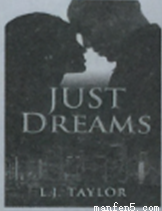题目内容
根据短文内容,从短文后的选项中选出能填入空白处的最佳选项。选项中有两项为多余选项。
How to Make Friends
Friendship is a very important human relationship and everyone needs good friends. Good friendship has many benefits. It offers companionship, improves self-worth and promotes (促进) good health. There are times in our lives such as when we have recently moved into a new town, or changed our jobs or schools. Such changes often leave us without a friend. 1.. But for many of us the process is difficult and requires courage. Below are some helpful suggestions on how to make and keep friends.
● Associate with (与……交往) others.
The first step to making friends is associating with other people. You can go to public places to meet new people. Besides, you will need to make yourself known by becoming an active member of such places.
● Start a conversation.
Starting a conversation is the second most important step in making new friends. 2. You can always start the conversation. Being able to make small talk is a very useful skill in relating with other people.
●3.
Choosing friends with common interests is important in building friendship as these interests would always bring you and your friend together. Hanging out (闲逛) will always be a pleasant experience.
● Let it grow.
It is a good thing to stay in touch. However, try not to press your new friend with calls, messages or visits as this would likely wear him or her out and finally you may lose your friend. 4.. The best friendships are the ones that grow naturally.
● Enjoy your friendship.
The best way to enjoy your friendship is to allow your friends to be themselves. 5. Try not to change them from who they are to what you want them to be. Become the kind of friend you will want your friend to be to you.
A. Do things together.
B. Be cheerful.
C. Making new friends comes easy for some people.
D. So you will need to give your friend time to respond to you.
E. Do not wait to be spoken to.
F. For a friendship to develop you need to stay in touch.
G. Try not to find fault with your friends.
Want to choose an English novel to enjoy? Here are four popular books sold on the website of Amazon, with formats and editions of kindle, hardcover, or paperback.
| The Handsome Enemy By Emily Walters ASIN: B01N7L0WCA Despite her unwillingness, Reagan Lister is required to work with Greg Pilster, another great lawyer, to prove that a senator’s son is not guilty of a murder for her latest case. The dangers in the process bring the two closer together and Reagan realizes that Greg, who she thought was her enemy, is winning her heart. The truth of the case is something that neither of them expected. |
| And the Mountains Echoed By Khaled Hosseini ASIN: B009XIXVU6 Khaled Hosseini, author of The Kite Runner and A Thousand Splendid Suns, has written a new novel that explores the many ways in which brothers and sisters nurture, would, betray, honor, and sacrifice for one another, and how often we are surprised by the actions of those closest to us, at the times that matter most. |
| The Secret Life of Bees by Sue Monk Kidd ASIN: B000W4RFBQ From the author of The Invention of Wings and set in South Carolina in 1964, the bestselling novel tells the story of Lily Owens, an escaped black girl taken in by three black beekeeping sisters and introduced to their attractive world of bees and honey. This is a remarkable novel about great female power and it’s regarded inspirational. It was adapted into an award-winning movie in 2008. |
| Just Dreams By L. J. Taylor ASIN: B00N6IRDGW Just Dreams is the first book in the Brooks Sisters Dreams Series. Lawyer file Kathy Brokks agrees to represent Charles Morgan Jr. in a high-profile case against a powerful government defense contractor. But when Charles’ hidden agenda threatens to expose the government’s dirty little secrets, what started out may cost Kathy her career and even her life. |
1.What is the ASIN number of the book manly telling family stories?
A. B01N7L0WCA B. B009XIXVU6
C. B000W4RFBQ D. B00N6IRDGW
2.Who probably intended his or her book to encourage women to face challenges bravely?
A. Emily Walters B. Khaled Hosseini
C. Sue Monk Kidd D. L. J. Taylor
3.Which book might be the best choice if Lucy is interested in adventurous and romantic stories?
A. The Handsome Enemy B. And the Mountains Echoed
C. The Invention of Wings D. The Secret Life of Bees
4.What do we know about Just Dreams?
A. The heroine defends the government bravely in the case but is faced with danger.
B. This book is one of the series of A Thousand Splendid Suns.
C. The film adapted from the book is very successful.
D. It may be thrilling to read the book.
